Watermelon Tea
Watermelon tea is a refreshing beverage that incorporates the flavors of fresh watermelon. It's generally made by infusing water with watermelon flavor and combining it with traditional tea leaves.
Ingredients:
- Watermelon juice/puree
- Tea leaves (black, green, or herbal)
- Sweetener (optional)
- Ice cubes (for serving)
Preparation Method:
Bestsellers
- Infuse the Tea: Begin by steeping your choice of tea leaves in hot water to create a strong base.
- Add Watermelon: Once the tea is ready, mix in watermelon juice or puree.
- Sweeten (if desired): You may add honey, sugar, or any sweetener to taste.
- Chill: Cool the mixture in the refrigerator.
- Serve: Pour the chilled tea over ice cubes and enjoy.
Nutritional Information:
While the exact values can vary, here's a basic outline for an 8 oz serving:
- Calories: ~40 kcal
- Sugars: Naturally occurring sugars from watermelon
- Caffeine: Varies based on tea choice
Health Benefits:
- Hydration from watermelon content
- Antioxidants from tea leaves
When making watermelon tea, you can customize it to your preferences. For example, using green tea will provide a more herbal undertone, while black tea offers a robust flavor. Herbal teas complement the watermelon with a floral note. The natural sweetness of watermelon reduces the need for added sugars, making this tea a healthier choice. Enjoy watermelon tea as a summer beverage for its thirst-quenching properties.
Health Benefits of Watermelon Tea
Watermelon tea offers a variety of health benefits, ranging from hydration to potential weight loss assistance. Each aspect is rooted in the tea's unique composition.
Hydration and Electrolytes
Watermelon is made up of over 90% water, making watermelon tea an exceptional drink for staying hydrated. In addition to water, watermelon provides important electrolytes like potassium and magnesium, which are crucial for your body's hydration balance.
- Potassium: Essential for muscle function and nerve signaling.
- Magnesium: Important for energy production and DNA synthesis.
Antioxidants and Nutrients
Watermelon tea is rich in antioxidants, including lycopene and vitamin C, which help fight oxidative stress and may reduce your risk of chronic diseases.
- Lycopene: An antioxidant linked to heart health and skin protection.
- Vitamin C: Supports immune function and skin health.
Weight Loss Support
Drinking watermelon tea may aid in weight loss due to its low calorie content and potential to increase feelings of fullness.
- Low Calorie: An 8-ounce serving contains minimal calories.
- Satiety: The high water content can help you feel full, potentially reducing your overall calorie intake.
Preparing Watermelon Tea
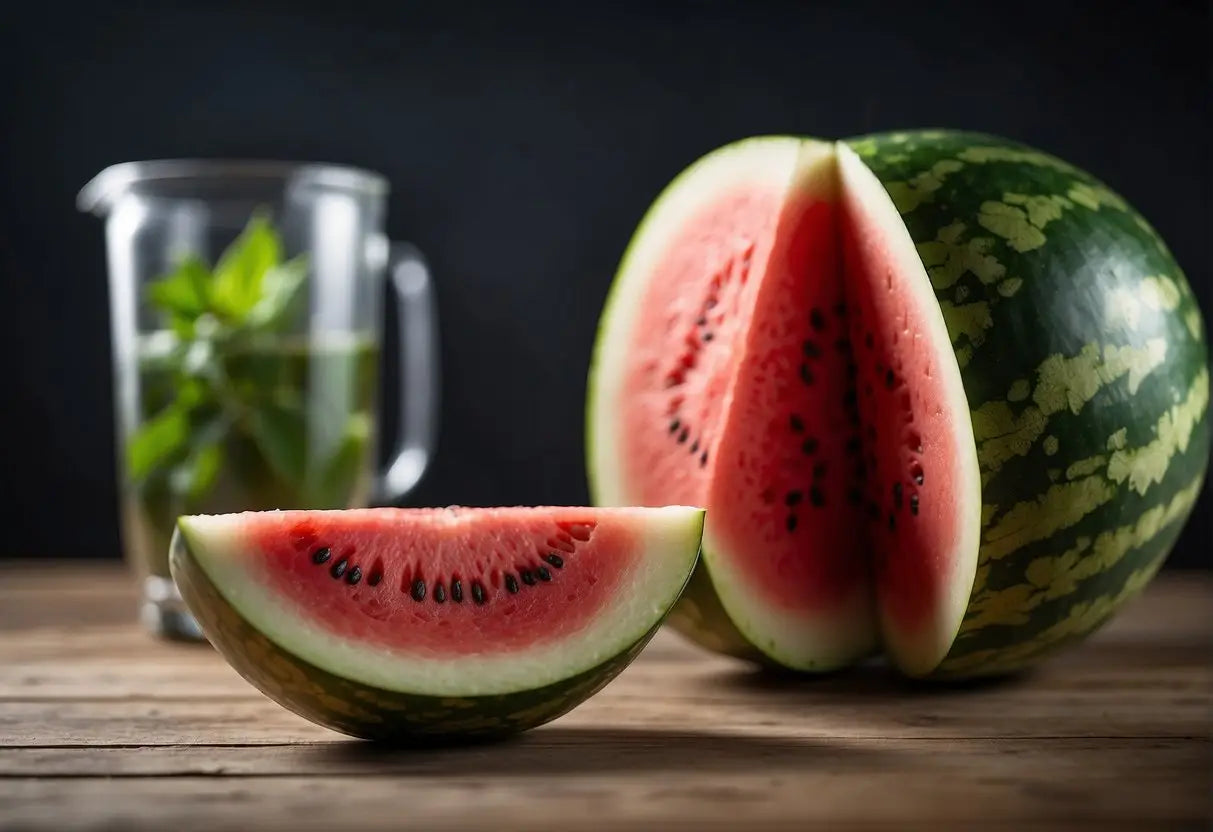
In preparing watermelon tea, your choice of ingredients and brewing method will greatly influence the flavor. Serving it properly can enhance the drinking experience.
Selecting Ingredients
- Watermelon: Choose a ripe, sweet watermelon. You'll need about two cups of cubed fruit.
- Tea Base: Select a high-quality green or black tea as the foundation.
- Sweetener (Optional): Honey or sugar can be added to taste.
- Garnishes: Fresh mint leaves or a slice of lemon.
Brewing Techniques
- Infuse Watermelon: Puree the watermelon cubes and strain the juice.
- Brew Tea: Heat water to just before boiling—about 175°F for green tea, 212°F for black tea. Steep the tea for 2-3 minutes.
- Combine: Mix the watermelon juice with the brewed tea. Strain if a clearer tea is desired.
Serving Suggestions
- Temperature: Serve watermelon tea hot or chilled over ice.
- Garnish: Add a sprig of mint or a lemon slice to the glass.
- Sweetness: Sweeten with honey or sugar if desired, stirring well.
Cultural Significance
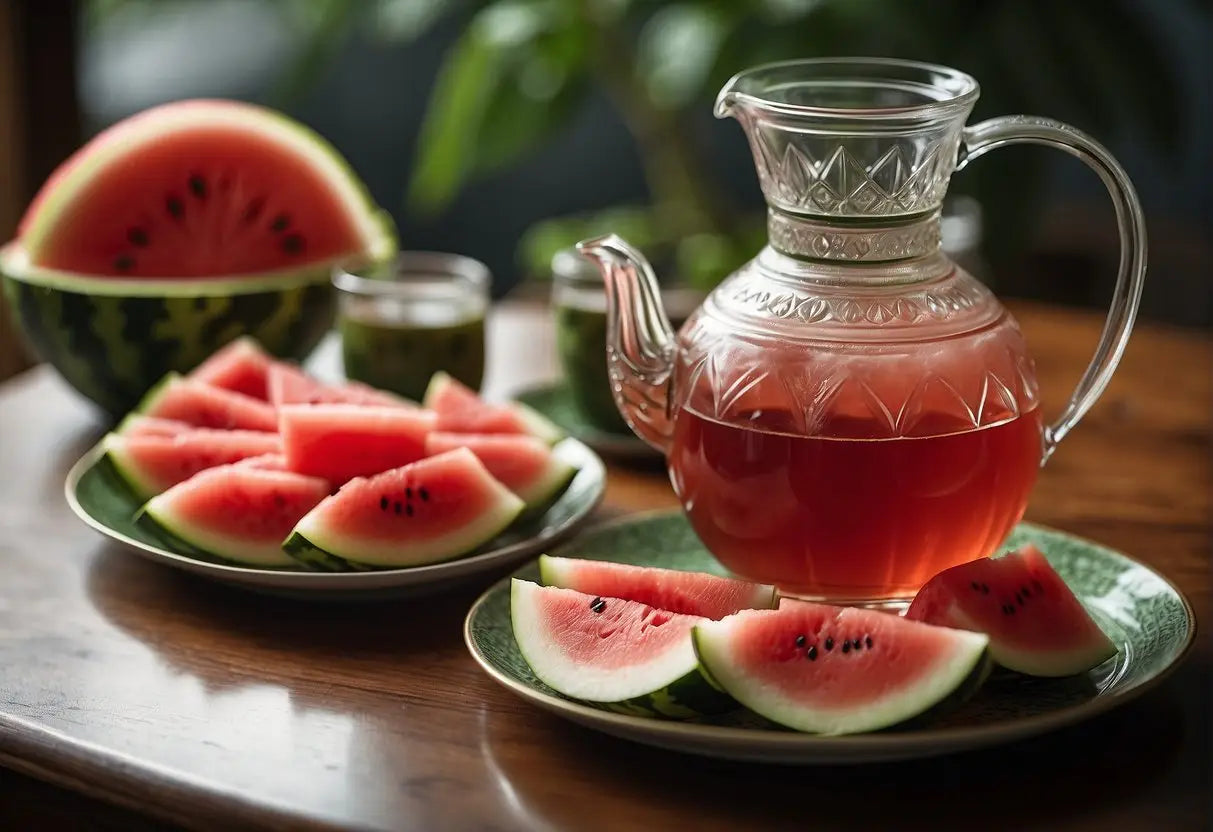
Watermelon tea holds a unique place in various cultures, reflecting differing usages through time from traditional remedies to modern refreshing beverages.
Lao Ban Zhang
Traditional Uses
In traditional Chinese medicine, watermelon tea was esteemed for its cooling properties. You might find that it was prescribed to aid in the treatment of heatstroke and dehydration. It was made by steeping dried watermelon rind, which was believed to help with urinary tract infections.
Contemporary Trends
In recent years, watermelon tea has become a popular summer drink. Artisan tea shops have begun offering watermelon-flavored green and herbal teas, highlighting the fruit's sweet and refreshing taste. On social media, posts featuring watermelon tea garnished with fresh mint and served over ice have gained considerable attention, reflecting its standing as a trendy, health-conscious choice.
Variations of Watermelon Tea
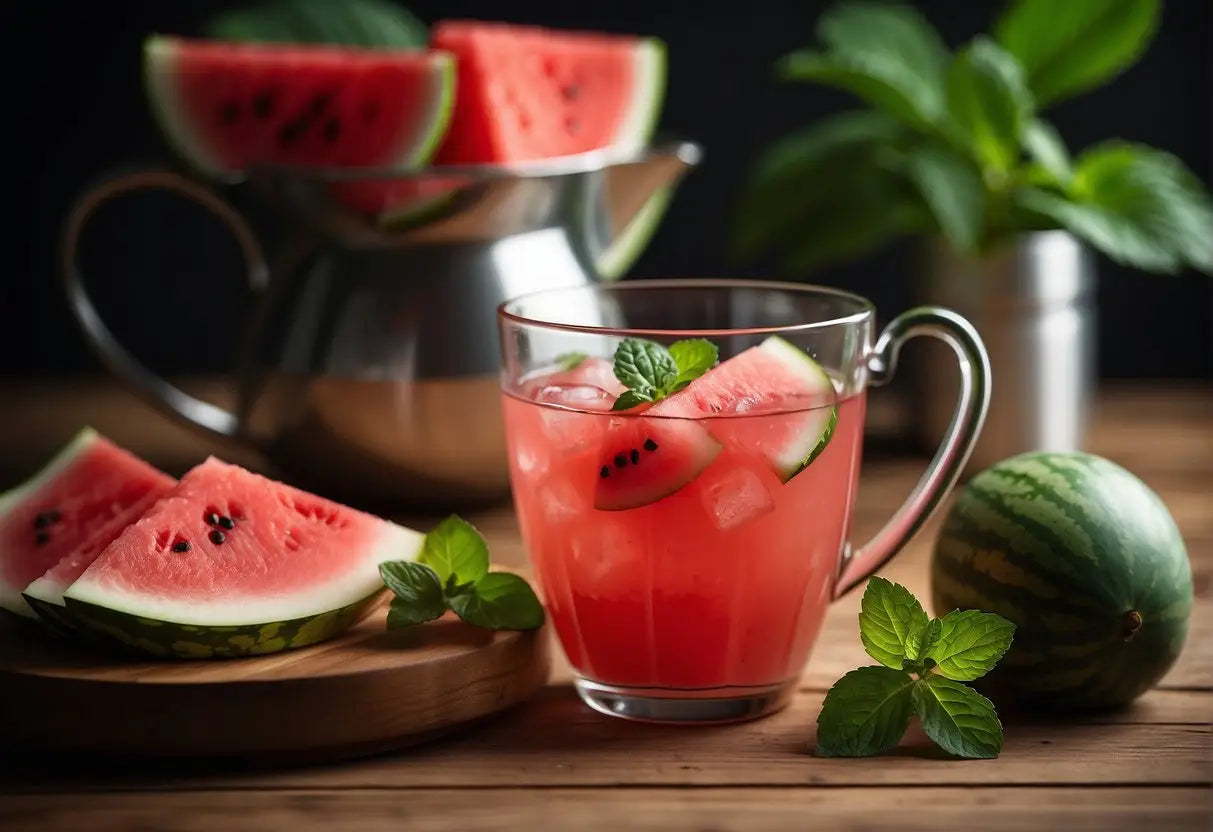
Exploring the variations of watermelon tea allows you to enjoy this refreshing beverage in several delightful forms.
Iced Watermelon Tea
Iced watermelon tea is a popular choice during warm weather. To prepare, you steep watermelon-flavored tea leaves or blend fresh watermelon juice with your favorite tea. Serve this cold over ice for a refreshing drink.
- Ingredients: Watermelon-flavored tea leaves or fresh watermelon juice, your choice of tea (black, green, or white)
- Preparation: Steep or blend, then chill and serve over ice
Watermelon Tea Blends
Watermelon tea can be combined with various tea blends to create unique flavors.
- Black Tea Blend: The robust flavor of black tea mixed with the sweet taste of watermelon offers a satisfying, rich drink.
- Green Tea Blend: For a lighter touch, combine watermelon with green tea, which provides a subtle, refreshing experience.
Pro Tip: Experiment with different tea blend ratios to find your perfect match.
Herbal Infusions
Herbal infusions using watermelon enhance the natural sweetness and do not contain caffeine, making them ideal for any time of the day.
- Mint and Watermelon: Mint leaves provide a cool, crisp finish to the sweet watermelon flavor.
- Chamomile and Watermelon: For a soothing nighttime beverage, pair watermelon with chamomile flowers.
Preparation: Infuse fresh watermelon pieces with the chosen herbs and let them steep to release the flavors.
Pairing with Foods
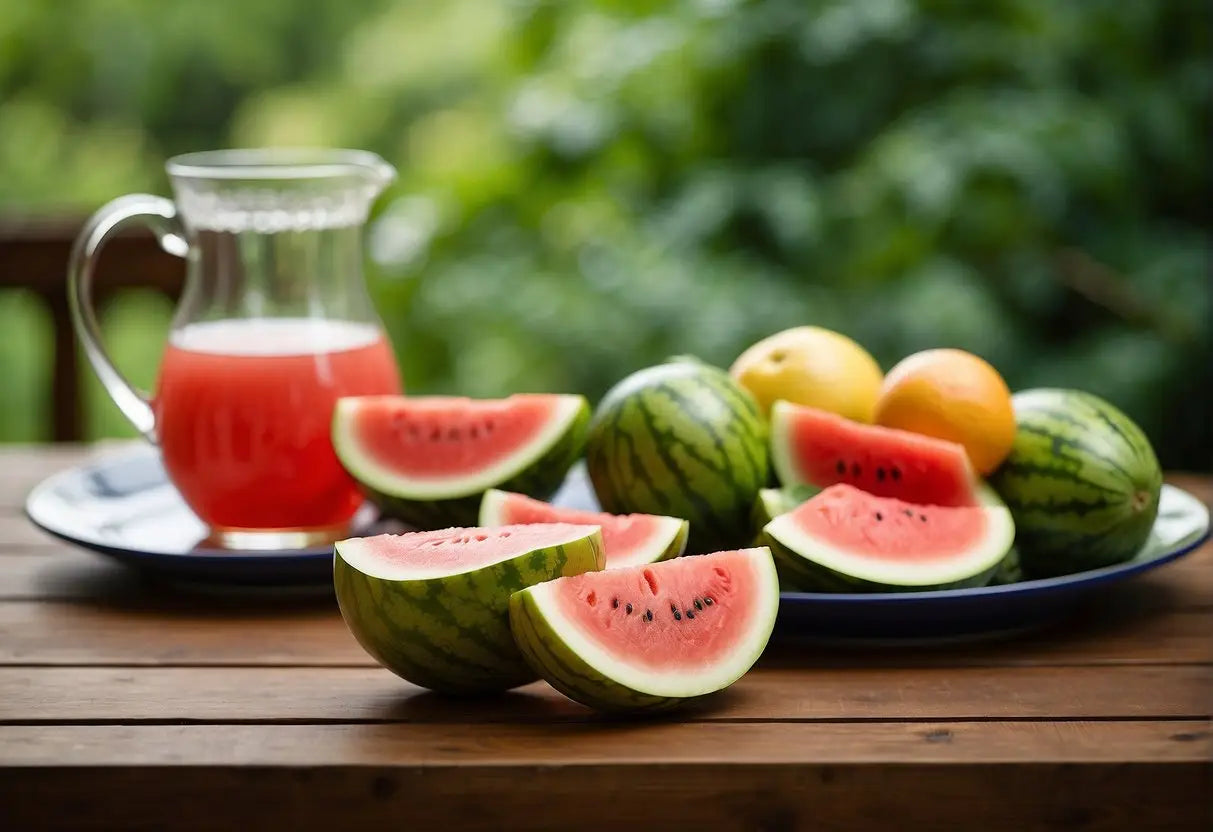
When enjoying watermelon tea, pairing it with the right foods can enhance your overall experience. You'll want to opt for foods that complement the fresh and slightly sweet flavor of the tea.
- Fruit Salads: A fresh fruit salad, particularly with berries and mint, plays well with watermelon tea’s fruity notes.
- Light Sandwiches: Try cucumber or turkey sandwiches with a hint of cream cheese. The lightness of these sandwiches won't overpower the delicate tea.
For desserts, consider these options:
- Vanilla or Lemon Cakes: The subtle flavors won't clash with your tea.
- Scones: Pair with clotted cream and a touch of jam for a classic tea time treat.
If you're looking for something more substantial, here's what works well:
- Grilled Chicken: Seasoned simply with herbs, it complements the tea without overwhelming it.
- Seafood: Especially grilled shrimp or a light seafood salad.
Remember to consume the tea while it's hot to best enjoy its flavor alongside these foods. Enjoy your tea time!
Watermelon Tea in Culinary Recipes
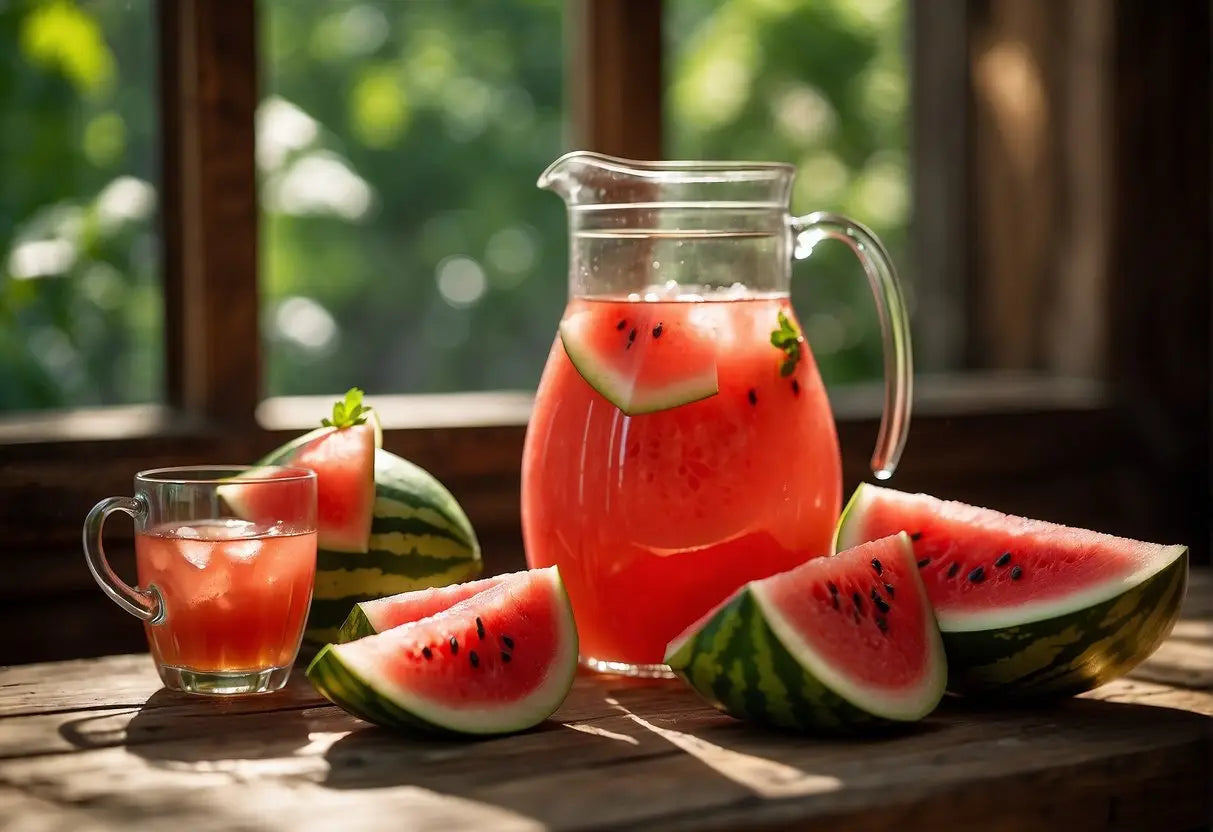
Watermelon tea, with its subtle sweetness and refreshing taste, can elevate a variety of recipes. It's a versatile ingredient that adds an unexpected twist to both sweet and savory dishes.
Desserts
Watermelon Tea Sorbet
- Steep 1 cup of watermelon tea, chill, then blend with 2 cups of fresh watermelon cubes.
- Freeze the mixture, stirring occasionally, until it reaches a granular, icy consistency.
Infused Panna Cotta
- Infuse 1 cup of heavy cream with watermelon tea leaves by simmering for 5 minutes. Strain and cool.
- Follow your panna cotta recipe, using this infused cream for a fruity undertone in the dessert.
Savory Dishes
Glazed Chicken
- Create a glaze by reducing 1 cup of brewed watermelon tea with 2 tablespoons of honey and a splash of soy sauce.
- Brush the glaze onto the chicken during the last 10 minutes of roasting for a sticky, aromatic finish.
Tea-Infused Quinoa Salad
- Cook 1 cup of quinoa in 2 cups of watermelon tea instead of water.
- Toss the cooked quinoa with diced cucumbers, tomatoes, and a lemon vinaigrette for a refreshing salad.
Growing Watermelons for Tea
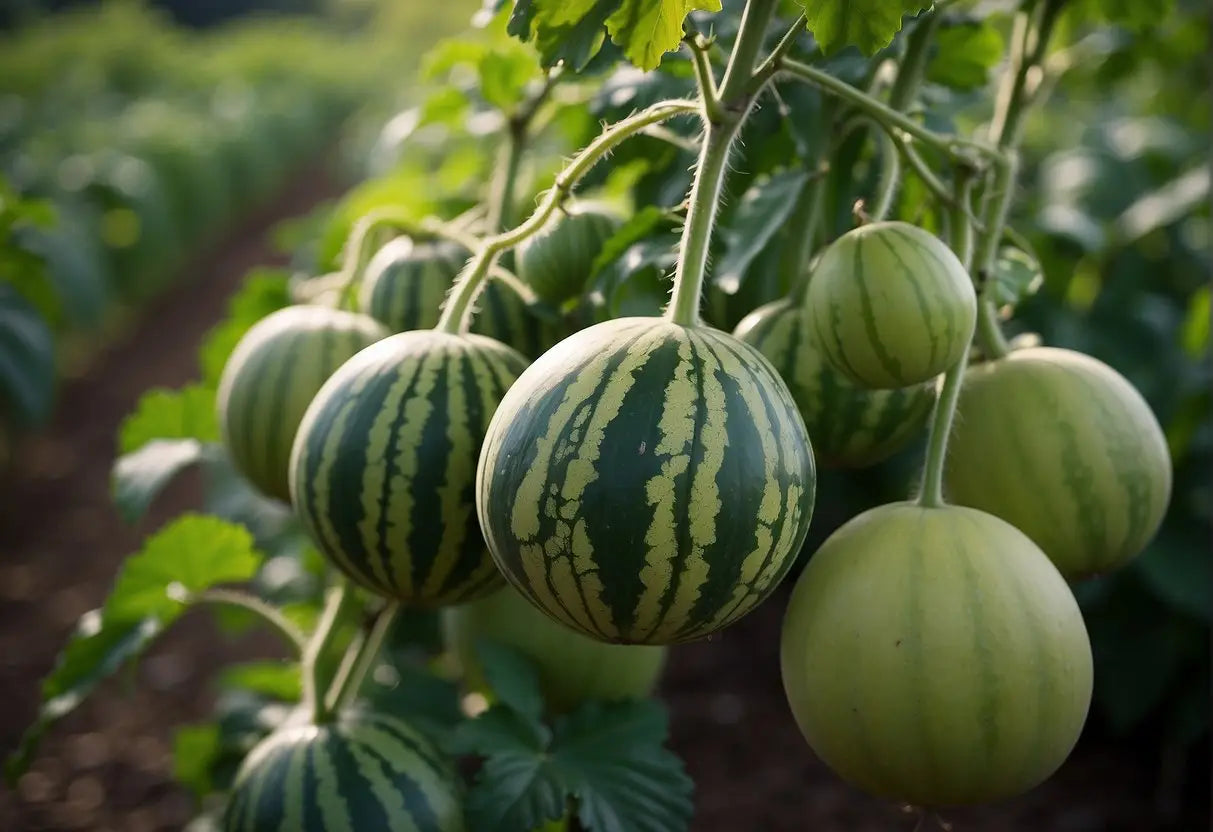
When considering watermelon varieties for tea, you want to prioritize fruit with a vibrant red hue and a rich flavor profile. Opting for sweeter varieties enhances the tea's natural sweetness. Begin by choosing a sunny plot with well-draining soil, as this is crucial for healthy growth.
Soil Preparation:
- Enrich your soil with compost.
- Ensure pH levels are between 6.0 and 6.8.
Planting:
- Sow seeds directly into the ground when soil temperatures reach at least 70°F.
- Plant seeds one inch deep in mounds or rows.
- Space mounds about 2 feet apart, with 4 to 6 feet between rows.
Watering and Care:
| Watering | Fertilizing | Pest Management |
|---|---|---|
| Consistent, deep watering is essential, especially during fruit setting and growth. | Use a balanced, water-soluble fertilizer every 3-4 weeks. | Regularly inspect for pests like aphids and use appropriate treatments if necessary. |
Harvesting:
To know when your watermelons are ready for tea, look for:
- The 'ground spot' turning yellow.
- The rind becoming dull and hard to pierce.
- A hollow sound when tapped.
Upon harvesting, use the fruit to prepare your tea. You can use the rind, flesh, or both depending on your preference for flavor. Infuse chopped pieces in boiling water or brew dried rinds for a concentrated taste. Enjoy the fruits of your labor in a refreshing cup of homemade watermelon tea.
Sustainability and Environmental Impact
When you consume watermelon tea, you engage with both agricultural and manufacturing processes that have distinct environmental footprints. The cultivation of watermelons demands water resources, and the degree of this impact varies based on the farming practices used. For instance, drip irrigation is a water-efficient method that can mitigate the water usage considerably.
The production of watermelon tea involves several steps: harvesting, drying, and packaging. Each step utilises resources and energy. Harvesting watermelons manually can reduce carbon emissions compared to mechanized methods. Drying the fruit for tea can be done using solar dryers, which are a renewable option that lessen the reliance on fossil fuels.
Moreover, the packaging of watermelon tea can significantly impact sustainability. Biodegradable or recyclable materials are preferred to minimise waste. Look for packaging with recycling symbols or statements regarding sustainability practices.
Regarding pesticides, the use of organic farming methods eliminates the need for synthetic inputs, protecting the soil and water ecosystems. This practice not only supports your health but also promotes biodiversity.
Lastly, the transportation of watermelon tea contributes to its carbon footprint. Teas sourced from local producers help reduce transportation emissions, supporting local economies as a bonus.
Here's a quick checklist for you:
- Water Usage: Favor products from farms using water-efficient irrigation.
- Harvesting Method: Choose tea from brands that employ manual harvesting.
- Drying Process: Look for teas dried using renewable energy.
- Packaging: Select tea with environmentally friendly packaging.
- Pesticides: Opt for organic watermelon tea to avoid synthetic chemicals.
- Transportation: Purchase from local suppliers to cut down on emissions.
← Older post Newer post →











